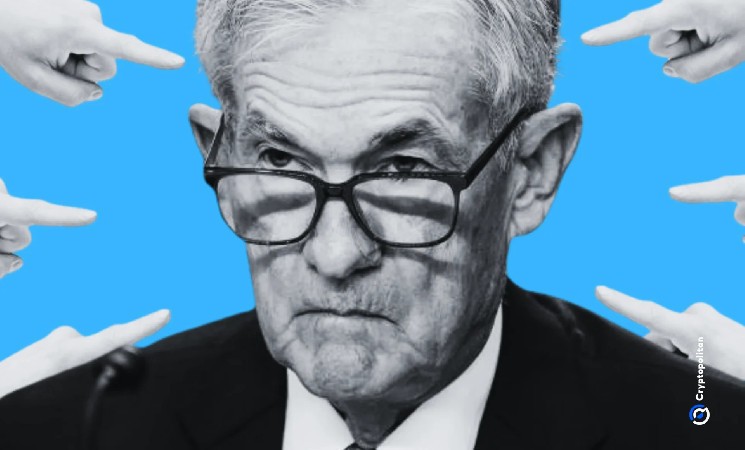Was the Fed pressured into a larger rate cut? Something doesn’t add up

The Federal Reserve (Fed) aggressively slashed interest rates Wednesday, announcing the first rate cut since March 2020. The decision surprised some economists and policy experts.
The Fed lowered its benchmark rate by 0.50 percentage points on Wednesday, or double the more typical 0.25 percentage point cut. This move marked a critical turning point in the Fed’s fight against the hottest inflation in 40 years.
Market odds overwhelmingly supported a 25 basis point cut the week before the decision. So what happened? Was the Fed pressured into a larger rate cut?
Fed Chair Jerome Powell said that the central bank is “not behind” the curve and that the entity’s decision to cut by half a point is “a sign of our commitment” to not fall behind in responding to the economy’s reality.
Fed rate cuts and hikes leave investors in limbo
Let’s get to the nitty gritty. One week before the meeting, markets saw a 70% chance of a 25 basis point rate cut. Also, 24 hours before the decision, the odds of a 25 basis point cut were as high as 72%.
On the other hand, the general sentiment heading into September supported the CME’s Fed watch sentiments. If the August jobs report showed a significant spike in unemployment, then a 50 basis point cut was needed.
However, if not, why would the the Reserve arm cut too quickly with core inflation still above 3%? According to a CNN report, there was no emergency demanding an aggressive rate cut in September or any part of this year. As predicted, the August jobs report showed that unemployment fell from 4.3% to 4.2%.
Soon after that report, the odds of a 50 basis point rate cut fell to 2%. This was less than two weeks before the September meeting.
Moments before the Reserve meeting, Democrats and Republicans called for 75 basis point rate cuts. The odds of a 50 basis point rate cut became the talk of Wall Street ahead of the meeting.
Earlier, August’s core CPI inflation was 3.2%. This marked the 41st consecutive month with 3.0%+ core CPI inflation and was well above the Fed’s 2% target.
During the Fed meeting, Powell said that the economy was still technically at “maximum unemployment.” This meant that the unemployment was below 5.0%. With that clear market direction, why did Powell make the decision he made on Wednesday?
Whether the Fed was pressured into a larger cut or not remains a debate. Was the intention to present a stable economy ahead of the November elections?
What remains clear is that it wasn’t a unanimous decision, and that should raise some red flags.





 Bitcoin
Bitcoin  Ethereum
Ethereum  Tether
Tether  USDC
USDC  Dogecoin
Dogecoin  Cardano
Cardano  TRON
TRON  Chainlink
Chainlink  Bitcoin Cash
Bitcoin Cash  LEO Token
LEO Token  Litecoin
Litecoin  Dai
Dai  Stellar
Stellar  Monero
Monero  Ethereum Classic
Ethereum Classic  Stacks
Stacks  Cronos
Cronos  OKB
OKB  Hedera
Hedera  Cosmos Hub
Cosmos Hub  Maker
Maker  KuCoin
KuCoin  Theta Network
Theta Network  Gate
Gate  Algorand
Algorand  Polygon
Polygon  NEO
NEO  EOS
EOS  Tether Gold
Tether Gold  Zcash
Zcash  Tezos
Tezos  TrueUSD
TrueUSD  Synthetix Network
Synthetix Network  IOTA
IOTA  Bitcoin Gold
Bitcoin Gold  Holo
Holo  Dash
Dash  0x Protocol
0x Protocol  Zilliqa
Zilliqa  Siacoin
Siacoin  Enjin Coin
Enjin Coin  Ravencoin
Ravencoin  Basic Attention
Basic Attention  Qtum
Qtum  Decred
Decred  Ontology
Ontology  NEM
NEM  Lisk
Lisk  Nano
Nano  Numeraire
Numeraire  Pax Dollar
Pax Dollar  DigiByte
DigiByte  Waves
Waves  Status
Status  Hive
Hive  Huobi
Huobi  Steem
Steem  BUSD
BUSD  Ren
Ren  OMG Network
OMG Network  Bitcoin Diamond
Bitcoin Diamond  Bytom
Bytom  Kyber Network Crystal Legacy
Kyber Network Crystal Legacy  HUSD
HUSD